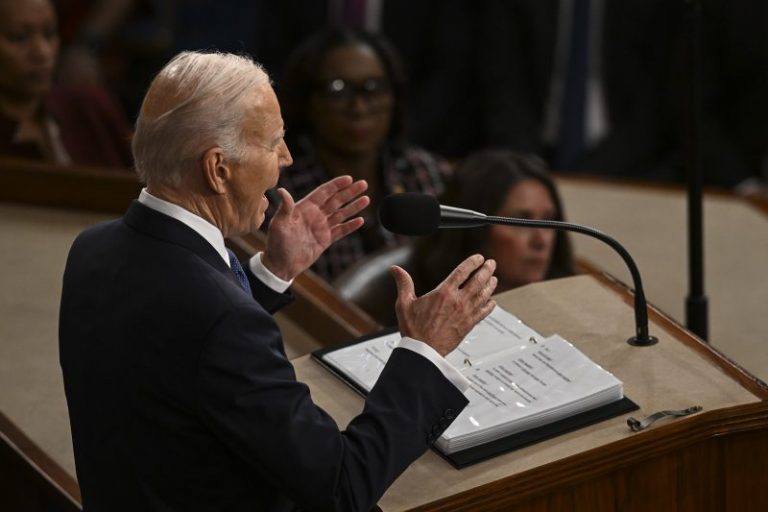One of the most contentious moments of Tuesday’s State of the Union address was when President Biden challenged Republicans for seeking to cut Medicare and Social Security spending.
“Instead of making the wealthy pay their fair share, some Republicans, some Republicans want Medicare and Social Security to sunset,” Biden said. Republicans in attendance loudly objected. “I’m not saying it’s the majority,” Biden continued, adding that he was happy to provide a copy of the proposal to any Republicans who thought he was being misleading.
Biden was referring explicitly to a proposal from Sen. Rick Scott (R-Fla.) that would force Congress to reauthorize all legislation every five years — meaning that funding for everything would vanish unless once again supported by the legislative branch. But the president might also have been referring to other rumblings from Republican politicians about potentially targeting the programs. The Washington Post covered this last month; HuffPost spoke with a leading Republican after the speech who admitted that changes to the programs might be needed.
But in the moment, Biden and the Republicans eventually landed in the same place. One of the relatively few moments of bipartisan applause centered on agreement that protecting Social Security and Medicare should be a central concern of the federal government.
There’s a very good reason this is where they ended up. America’s population is growing older at a rapid, unprecedented clip, meaning that the number of people relying on those programs is soaring. And because older Americans vote more, very few elected officials want to go on record in favor of cuts.
Over the course of the speech, Biden mentioned seniors (or the elderly) nine times, the most the group has been mentioned in any State of the Union in the past 40 years. He also mentioned Medicare and Social Security more frequently than past presidents, though that was in part due to his back-and-forth with the attending Republicans.
The prior points at which discussions of Medicare and Social Security were common were during the presidencies of Bill Clinton and George W. Bush. In the late 1990s, Clinton warned about the danger that the Social Security Trust Fund could be expended by 2032, suggesting that the federal government’s sudden budget surplus be largely dedicated to backstopping the program. A few years later, Bush advocated for reforms to both programs. He warned that Social Security would be broke by 2042 as he pushed for changes such as letting younger workers divert savings to personal accounts.
Those were moments when America was aging, but not to the degree we see now. In 1990, there were about 31 million people age 65 and over, a group that made up about 13 percent of the population. Ten years later, that group was about 35 million people and nearly the same percentage of the population.
Now, there are more than 54 million people age 65 and older, 16 percent of the population. And the Census Bureau expects those figures to surge over the coming decades.
This is because of the baby boom. The surge in births that began in 1946 led to a surge in 65-year-olds starting in 2011. The boom peaked in the late 1950s, though, meaning we are seeing people added to this age group at a rapid clip. In 2021, there were 4.2 million 63-year-olds in the United States, meaning that, on average, about 11,500 people are hitting retirement age every day this year.
Since the baby boom began, this has been the pattern: a huge surge of people of a given age, forcing the economy and politicians to accommodate them. (I’ll note here that I wrote a book on the subject.) What we’re seeing now with the government trying to figure out how to respond to this increase in retirees is the same thing the country saw when the boomers entered the workforce or when they hit kindergarten age: Things had to change to account for the generation’s scale.
There’s another important aspect here. It has traditionally been Republican elected officials who have sought to overhaul these programs. But older Americans make up much more of the Republican Party than the Democratic one. Analysis of the voter file The Post completed last month shows that people 65 and over make up a third of registered Republicans. Nearly two-thirds of the party is 50 or over. So potential threats to programs used by older Americans should be less palatable to the GOP in the moment, not more.
It’s probable that we’re at the tip of the iceberg on this issue. The number of senior citizens is expected to continue to rise over the coming decades, thanks in part to the baby boom. The percentage of the population that is 65 and older will continue to climb. The need to backstop programs benefiting older Americans will only grow.
Biden, America’s first Silent Generation president, is aware of this pattern. He knows that elevating threats to Social Security and Medicare (however imminent) is an effective way to knock Republicans off balance; he probably also knows that the GOP base is more reliant on these programs than his own. In other words, the aging of the baby boom has helped make Social Security more of a wedge issue for Democrats.
Those short-term politics, though, are less fraught than the long-term ones. The surge in working-age Americans as the baby boomers hit their 20s helped balloon Social Security Trust Funds — funds now being drawn from as those workers age. It’s another in the long series of shocks to the system the baby boom has aged. And it’s still to be determined how it is resolved.

